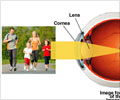
During visual development in childhood and adolescence the eye grows in length, but in myopes it grows too long, and light entering the eye is then focused in front of the retina rather than on it. This results in a blurred image. This refractive error can be corrected with glasses, contact lenses or surgery.
However, the eye remains longer, the retina is thinner, and this may lead to retinal detachment, glaucoma or macular degeneration, especially with higher degrees of myopia. Myopia is highly heritable, although up to now, little was known about the genetic background.
To find the genes responsible, researchers from Europe, Asia, Australia and the United States collaborated as the Consortium for Refraction and Myopia (CREAM).
They analysed genetic and refractive error data of over 45,000 people from 32 different studies, and found 24 new genes for this trait, and confirmed two previously reported genes. Interestingly, the genes did not show significant differences between the European and Asian groups, despite the higher prevelance among Asian people.
The new genes include those, which function in brain and eye tissue signalling, the structure of the eye, and eye development. The genes lead to a high risk of myopia and carriers of the high-risk genes had a tenfold increased risk.
Advertisement
An unfavourable combination of genetic predisposition and environmental factors appears to be particularly risky for development of myopia. How these environmental factors affect the newly identified genes and cause myopia remains intriguing, and will be further investigated by the consortium.
Advertisement
These findings have been published in the journal Nature Genetics.
Source-ANI











